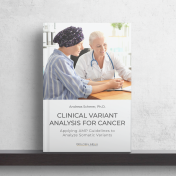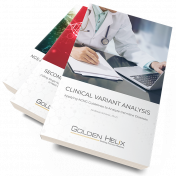Clinical Variant Analysis for Cancer – Applying AMP Guidelines to Analyze Somatic Variants Analogous to the ACMG guidelines for germline mutations, the Association for Molecular Pathologists (AMP) has issued guidelines to assess and report on somatic variants. The key paper in this area was published by Li et. al (2017) with the title “Standards and Guidelines for the Interpretation and… Read more »
Clinical Variant Analysis for Cancer – Applying AMP Guidelines to Analyze Somatic Variants Precision Medicine uses genetic information from individual patients. This may include the following areas: Diagnosis Treatment Prevention Specifically, in the cancer space, data derived from Next-Gen Sequencing (NGS) is used to diagnose and prognose diseases, select a targeted therapy and potentially evaluate the suitability of a patient… Read more »
Applying AMP Guidelines to Analyze Somatic Variants Today, I am thrilled to share with you the launch of a brand new eBook titled “Clinical Variant Analysis for Cancer – Applying AMP Guidelines to Analyze Somatic Variants”. We would happy to send you a complimentary copy which can be requested on our website here. The clinical utilization of Next-Gen Sequencing data… Read more »
Overview VSClinical enables users to evaluate variants according to the ACMG guidelines in a high-throughput fashion and obtain consistent results and accurate variant interpretations. This feature is tightly integrated into our VarSeq platform as well, and when paired together, users can evaluate NGS data and obtain clinical reports all in one suite. Coupled with the ability to find novel or… Read more »
VSClinical provides a rapid-fire way to investigate any variant’s impact by following the ACMG Guidelines process for classification. We will be demonstrating this by looking at interesting examples of rare disorders and showcasing some evaluation steps users may deploy in their analysis. Our first example in this blog series is for a patient who has an indifference to pain, while… Read more »
In the previous two articles, we explored the different steps of a clinical workflow. The first post covered the automated analysis that creates a VarSeq project. While the second post covered the interpretation steps and generation of a clinical report. These posts illustrated the ease with which these complex tasks can be carried out. Today we’ll dig a little bit… Read more »
In the previous blog post, we covered the automated steps to create a VarSeq project. Today we will examine the active analysis steps. These are the steps that require human interpretation to analyze the clinically relevant variants. A lab tech can take the first pass at the output in the generated VarSeq project. They can perform the quality control and… Read more »
Automating a clinical workflow creates a stable and repeatable clinical analysis. Automation reduces the potential to introduce human error, helps in regulatory compliance, and improves the precision of the clinical results. It is important to know that if you run a sample through your clinical pipeline, you are going to get the same results today as you will in 6… Read more »
Mark Trinder is our 2019 Abstract Competition 1st Place Winner. As we prepare for his upcoming webcast on April 10, 2019, we wanted to give our community a little bit of a background on him! Mark Trinder is an MD/Ph.D. student at the University of British Columbia, Canada working under the supervision of Dr. Liam Bruham. Mark’s research focuses on… Read more »
This year has been full of excitement for our team, and customers as well; we have a plethora of recently published articles citing Golden Helix! We would like to congratulate everyone on their success. Please enjoy these features articles, or see the full list here. SNP & Variation Suite Di Gerlando, R.; Mastrangelo, S.; Sardina, M.T.; Ragatzu, M.; Spaterna, A.;… Read more »
Examples of Clinical Variant Interpretation with VSClinical In this chapter, I’d like to go through a few examples for variants that have been classified with the help of VSClinical. This will give you a better understanding of how data sources are actually being represented in the software and how those are used to make decisions on applicable criteria. It goes… Read more »
Clinical Variant Analysis – Classification Criteria of Benign Variants The classification of benign variants is overall simpler and more straightforward, with the majority of benign variants being eliminated through allele frequency in various population catalogs. BA1 If a variant is common in one or more population catalog, as indicated by the allele frequency associated by the appropriate sub-population, it can… Read more »
We would like to thank everyone who entered our 2019 Abstract Competition. This event is an excellent opportunity for our team to hear the unique ways Golden Helix software is being applied around the world. We had a number of remarkable entries this year which made our selection process a daunting one, indeed. It is my pleasure to announce this… Read more »
Clinical Variant Analysis – Applying ACMG Guidelines to Analyze Germline Diseases The clinical interpretation of genetic variants is time-consuming and requires strict attention to detail. Clinicians must thoroughly review any variants that could potentially cause disease using a complex set of guidelines. There are guidelines for the interpretation of variants relating to hereditary risk, germline diagnostics issued by the American… Read more »
This blog will conclude our VSClinical Best Practice Workflow series and focuses on one of our new reports: VSClinical ACMG Gene Panel Template. This template is valuable because it automatically enters your variant interpretation from the ACMG Guidelines into the report and eliminates the need for manual submission. I would like to explain how to properly implement this report into… Read more »
In part one of this series, we discussed how the ACMG Classifier can be implemented in your filter chain to support a best practice workflow. To continue our discussion on best practices of VSClinical, this blog will shed light on other attributes of VSClinical that can add support to your evaluation. Specifically, we will explore how VSClinical can help users… Read more »
VarSeq Stable 2.1.0 is Ready for Clinical Validation, See it in Action Next Week This week we are happy to see the general availability of VarSeq 2.1, the culmination of the last five months of work since we launched VSClinical. We have been blown away by the adoption of VSClinical, outpacing any previous product launch in terms of the pace… Read more »
In the first two parts of this blog, we presented examples of how to leverage Warehouse-stored VSClinical and CNV assessment catalogs in the VarSeq project. Now we are going to explore the Warehouse interface a bit more and show how to query on stored variant data. To access Warehouse from VarSeq, click the V Connect icon located in the top… Read more »
We recently hosted a webcast covering the value and application of VSWarehouse through VarSeq. Not only is VSWarehouse a solution for storing your NGS data in a central repository, but it also provides a means to enhance the tertiary analysis done in VarSeq. VSWarehouse will store all your sample/variant data but also stores your catalogs of pathogenic variants, clinical reports, and has the capability of filtering/querying on all your stored data quickly. In addition,… Read more »
This webcast generated some great questions! If you have any other questions for me that are not answered below, please feel free to ask those by emailing support@goldenhelix.com. To what level does the Warehouse scale? We have tested multiple instances of Warehouse in-house and on the cloud and it scales incredibly well to tens of thousands of samples and 100s… Read more »










